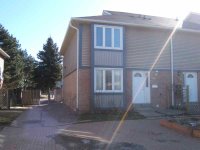This Article covers some of the considerations when Buying a house for your child who may be attending University or College - from bankrate.com
We've all seen a typical student house: Canadian flag in the window, beer bottles on the lawn from last week's -- or last month's -- party and broken windows here and there.
But that image wasn't a concern for Debbie Smith when she and her husband bought a house for their son to live in, while he attended university. "What surprises me is the sense of pride they have where they live -- it's clean, and they even have a schedule to clean the bathroom," says Smith, whose son, Josh, is in his fourth year of agriculture business at Ontario's University of Guelph.
Investing in a second house hasn't produced a huge surplus for the Smiths, but they always planned to help Josh pay for his housing while at school. And this way, he has a little extra cash from the rent his roommates pay to put toward his groceries. Rent from the five tenants covers the mortgage and, in a few years, the Smiths's younger son will also have a place to live during his studies, if he chooses.
Everything has worked out pretty well, says Smith, and she'd recommend it to parents of soon-to-be-students, but there are a few considerations. Not all kids are as responsible as Josh and not all tenants clean bathrooms. If you plan on buying a house for the student in your family, read on to find out what is involved.
Where and what to buy
When trying to figure out what type of property to buy, a townhouse is a good bet. "For the amount of space, with a finished basement, the price and number of rooms, townhouses are always popular," Choose one that has potential to increase in value, so when you sell it, you can help your child pay off any debts he might have incurred during his time at school.
Location is another important factor. Many parents try to buy somewhere close to the school. But depending on the neighbourhood, that might be quite pricey. At the University of Western Ontario, in London, for example, the homes close to campus are older and more expensive than townhouses further away from school.
In people's experience, parents and students are willing to buy outside of the immediate campus area provided they are on a major public transit route and have amenities such as grocery stores close by. So, it's always a good idea to check out outlying neighbourhoods, not just what's within walking distance to campus.
Finding good roommates is keySmith only advises buying a house if your child is responsible. In his house, Josh isn't responsible for collecting rent cheques, but he does collect each roommate's portion of the utilities. "I can't say he hasn't felt pressure sometimes when he can't get utilities from such and such a kid," she admits, but for the most part, he's kept up his part of the bargain.
She also suggests having your child help find dependable roommates. Josh initially screened the would-be housemates and then passed them over to his parents for a second meeting. The same tenants have been there for the past three years, and it's a good mix of three groups of friends. Smith warns parents to pick wisely: "I recommend not having one group of friends. A couple of pairs works out best, otherwise it will become a party household."
The best scenario is always to try have a family member live in the house. Whether it's a niece, son or daughter, you know someone is there, watching out for your investment. "If you're an absentee landlord, things can get in bad shape," says Irmler. "In general, family members have a good reason to keep the place in good shape."
Mortgage matters
From a financial perspective, having a family member live in the house can also save you from having to make a huge down payment on the mortgage, says Irmler. In general, if there are no family members living in the house, the banks want more security up front. Irmler also sees many couples use the equity in their own home as a buffer on the second mortgage.
Some, but not many, parents will also place the house in the child's name. To do that, the child must qualify for the mortgage on her own. It can be a tricky situation because if there is a default on the mortgage, it lands on the child. "There's a potential negative impact on the child's credit rating in the most important time in their life,"
But, if the child can handle it, and she is able to collect rent every month without too much difficulty, it could help out her credit rating in the future to have a house in their name.
Because the house generates rental income, it will be taxed. If the property is in the child's name, the tax rate will be lower because students tend to be in lower tax brackets than their parents. But most parents put the house in their own name, if for no other reason, to be able to sell the house immediately after their kids graduate.
Also keep in mind that, as with any second property, you must pay capital gains tax on it when you decide to sell.
Before you sellIf, after a degree or two, the keg parties and wild nights have taken their toll on the condition of the house, you might not make any money when it comes time to sell. Even if the house hasn't been damaged and simply lacks ambience or decorating style, you still might get less than the original price.
"If a young couple with a child have decorated and fixed up [an older home], it will go faster than the one-room with a mattress on the floor," says Irmler. She says owners usually go in after the roommates have left to spiff up the house before putting it on the market. She suggests removing the carpet, freshening up the paint and adding a few flowers outside to finish it off.
Mark's comments:This is a very interesting article and probably applies to many of my clients with children nearing the university years. There are many incentives from a tax point of view in purchasing an investment property for your child and other students to live in during university and possibly beyond. Please take into consideration that you may have RESP's or other education funds that you may be drawing on and this will affect your child's income level and tax consequences. Your child will likely work during the summer holidays and it's easy for a student to earn over $10,000 in 4 months, thus this will eliminate their basic personal exemption, let alone any rental income.
There are many other considerations when buying a property for your child while they are at school, please don't hesitate to contact me with any questions you may have.
 Investment Property Purchase Considerations
Investment Property Purchase Considerations
For more information please contact A. Mark Argentino
A. Mark Argentino, Broker, P.Eng.,
Specializing in Residential & Investment Real Estate
RE/MAX Realty Specialists Inc., Brokerage
2691 Credit Valley Road, Suite 101, Mississauga, Ontario L5M 7A1
BUS. 905-828-3434
FAX. 905-828-2829
E-MAIL:
mark@mississauga4sale.comWebsite:
Mississauga4Sale.com

















